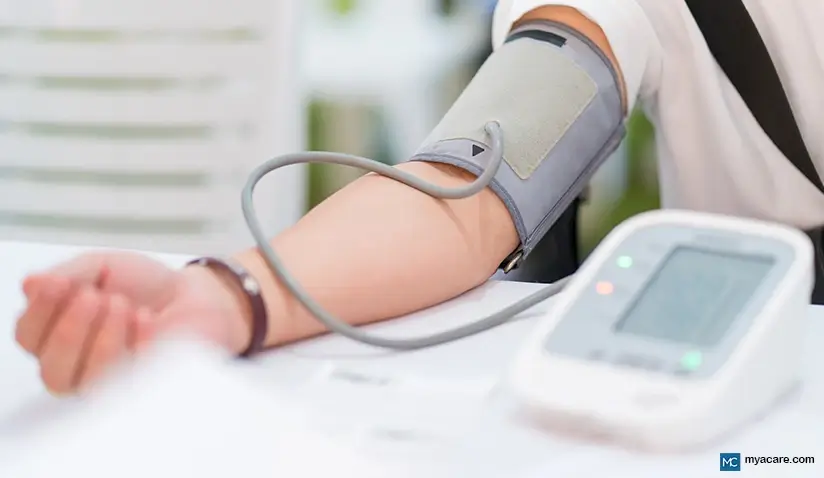What Causes High Blood Pressure?

Uncontrolled blood pressure for a prolonged period significantly increases your risk of many potentially serious conditions. These include chronic kidney disease, heart attack, heart failure, and stroke.
Fortunately, high blood pressure is preventable. Tracing the cause followed by implementing measures to eliminate the cause or reduce its effects, you can not only prevent it but also lower the risk of complications.
What is High Blood Pressure? Learn the Basics
When the blood flows through the blood vessels, it exerts pressure on the walls of the vessels. Well, this is natural and essential to ensuring enough blood reaches all the organs in the body.
With each heartbeat, the heart pumps blood into the blood vessels. Blood pressure during a heartbeat is called systolic pressure and that between heartbeats is called diastolic pressure.
The normal blood pressure is less than 120/80, which means a systolic of less than 120 and a diastolic of less than 80.
When your pressure increases beyond the normal levels, your heart has to work harder to ensure optimal blood supply. This is exactly when high blood pressure becomes a problem. Over time, it can lead to heart disease and problems with blood flow.
According to the National Heart, Lung, and Blood Institute, you have high blood pressure if the readings consistently show a systolic of 140 mm Hg or higher or diastolic of 90 mm Hg or higher.
Besides, those with heart risk factors such as obesity may be considered to have high blood pressure if their systolic is between 130 and 139 OR the diastolic is between 80 and 89.
High Blood Pressure Causes: Things You Should Not Miss
In many cases, the exact cause of high blood pressure is not known. It might come as a surprise that more than 90 percent of all cases have no identifiable cause. High blood pressure that develops without any identifiable cause is known as essential or primary hypertension.
Scientists have linked primary hypertension to factors such as genes, age, and age-related physical changes. Keep in mind that these factors are not modifiable and you cannot do much to alter them.
However, another type of high blood pressure develops because of different modifiable factors. These include drugs, heavy drinking, kidney disease, and certain tumors.
This type is known as secondary hypertension. Secondary hypertension often develops rapidly and can cause more damage than primary hypertension.
According to the NHS, in nearly 5 out of every 100 cases, high blood pressure results due to certain medical conditions or drugs.
Conditions linked to a rise in blood pressure include:
- Breathing problems during sleep, which is called obstructive sleep apnea
- Kidney disorders
- Adrenal gland tumors
- Too little thyroid hormones (hypothyroidism)
- Defects in blood vessels that are present at birth
- Certain prescription as well as non-prescription medications.
Treating the underlying condition can bring your blood pressure back to the normal levels.
In addition to the causes mentioned above, certain factors can significantly increase the risk of high blood pressure. Many of us probably know that eating too much salt and being overweight or obese can increase blood pressure.
The risk factors include:
Non-Modifiable Risk Factors
- Age. Increasing age is linked to a number of conditions including high blood pressure. If your age is 60 or more, you should consider testing for high blood pressure.
- Family history. If anyone in your family has high blood pressure, you have a higher risk compared to those without a family history of high blood pressure.
Modifiable Risk Factors
- Lack of physical activity. Physically inactive people have a 30-50 percent greater risk of developing high blood pressure. Besides, less active people are also likely to gain weight, which can raise blood pressure.
- Use of tobacco. If you are a smoker, have you noticed your heartbeat races once you smoke a cigarette? Well, this might be temporary. Nonetheless, smoking narrows your blood vessels and impairs blood flow through them.
- High salt intake. When you have too much salt in your body, your body tends to retain more fluid. This can raise your blood pressure.
- Heavy drinking. Consuming 10 g alcohol can cause a “1 mmHg” increase in blood pressure. Luckily, the effects wear off within 2 to 4 weeks if you do not drink during the period.
- Being overweight or obese. Obese people tend to have a greater risk of fat deposits inside the blood vessels. These deposits make it harder for the blood to flow. This increases blood pressure.
If you are worried about high blood pressure, talk to your doctor. To look for the best hospitals and doctors worldwide, please use our free search engine at myacare.com
Sources:
Featured Blogs



